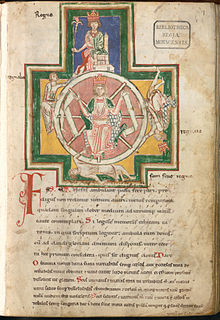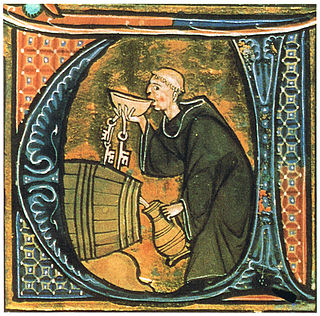
Carl Orff was a German composer and music educator, best known for his cantata Carmina Burana (1937). The concepts of his Schulwerk were influential for children's music education.

Carmina Burana is a manuscript of 254 poems and dramatic texts mostly from the 11th or 12th century, although some are from the 13th century. The pieces are mostly bawdy, irreverent, and satirical. They were written principally in Medieval Latin, a few in Middle High German, and old Arpitan. Some are macaronic, a mixture of Latin and German or French vernacular.

The Archpoet, or Archipoeta, is the name given to an anonymous 12th-century author of ten medieval Latin poems, the most famous being his "Confession" found in the Carmina Burana manuscript. Along with Hugh Primas of Orléans, he is cited as the best exemplar of Goliardic poetry and one of the stellar poets of the Latin Middle Ages.
Poetry took numerous forms in medieval Europe, for example, lyric and epic poetry. The troubadours and the minnesänger are known for their lyric poetry about courtly love.

Cockaigne or Cockayne is a land of plenty in medieval myth, an imaginary place of extreme luxury and ease where physical comforts and pleasures are always immediately at hand and where the harshness of medieval peasant life does not exist. Specifically, in poems like The Land of Cockaigne, it is a land of contraries, where all the restrictions of society are defied, sexual liberty is open, and food is plentiful. Writing about Cockaigne was commonplace in Goliard verse. It represented both wish fulfillment and resentment at the strictures of asceticism and dearth.

"O Fortuna" is a medieval Latin Goliardic poem written early in the 13th century, part of the collection known as the Carmina Burana. It is a complaint about Fortuna, the inexorable fate that rules both gods and mortals in Roman and Greek mythology.

Drolls is a Russian early music ensemble formed in 1999 and playing its own interpretation of Medieval and Renaissance music, using authentic instruments. The name of the ensemble refers to a droll - a short comical sketch of a type that originated during the Puritan Interregnum in England. Although their main repertoire consists of music and songs from across the Europe, they also sing and play music of skomorokchs.

A drinking song is a song sung while drinking alcohol. Most drinking songs are folk songs or commercium songs, and may be varied from person to person and region to region, in both the lyrics and in the music.

Carmina Burana is a scenic cantata composed in 1935 and 1936 by Carl Orff, based on 24 poems from the medieval collection Carmina Burana. Its full Latin title is Carmina Burana: Cantiones profanae cantoribus et choris cantandae comitantibus instrumentis atque imaginibus magicis. It was first performed by the Oper Frankfurt on 8 June 1937. It is part of Trionfi, a musical triptych that also includes Catulli Carmina and Trionfo di Afrodite. The first and last section of the piece are called "Fortuna Imperatrix Mundi" and start with the very well known "O Fortuna".

Cantus Buranus is an album by the German medieval revival band Corvus Corax that employs the medieval text Carmina Burana. Cantus Buranus is a stage opera of eleven poems from Carmina Burana for orchestra, choir and medieval instruments, incorporating medieval, classical and modern musical idioms. It is not the first time Corvus Corax has worked with Carmina Burana; the band Tanzwut used the poems "Fautue" and "Caupona" in their album Ihr Wolltet Spass.
The Verses pascales de tres Maries are twelfth-century Latin lyric verses from Vic that form a liturgical drama for performance at Easter. The play, by an anonymous cleric, is highly original in content and form, though it only runs ninety-four lines.
"Dum Diane vitrea", also known as "Nocturne", is a Medieval Latin song known only from the Carmina Burana, a thirteenth-century collection of poems and songs. Like most of the material in the Carmina, it is an anonymous piece, though some translators have speculated that it is the work of Peter Abelard. It is the 62nd piece from the collection and is part of the grouping referred to as "Love Songs".
In 1935–36, the 13th-century poem "O Fortuna" was set to music by the German composer Carl Orff for his twenty-five-movement cantata Carmina Burana. The composition appears in numerous films and television commercials and has become a staple in popular culture, setting the mood for dramatic or cataclysmic situations. For instance, it is used to portray the torment of Jim Morrison's drug addiction in the film The Doors. In 1983, Doors' keyboardist Ray Manzarek released his third solo album, Carmina Burana, which is an interpretation of the piece in a contemporary framework.
Carmina Burana may refer to:
"Phyllis and Flora" is the name of a medieval Latin song known from about a dozen sources. None of those sources has the complete poem; the version from the Carmina Burana, for example, only contains the first sixty one and a half stanzas, with the rest being lost prior to binding. It tells the story of a debate between two young women as to which type of man makes a better lover: clerics or knights. Unable to resolve the dispute, the two travel to the court of Cupid, where it is decided that clerics are superior. Translators and commentators have wryly noted that this is unsurprising, as the piece was almost certainly written by a Goliardic cleric.
Anthology is the 13th album by Ensemble Renaissance, released in 1997 on the Al Segno label in Germany. The double disc is the greatest hits compilation of the Medieval and Renaissance music; the material on this Anthology are remasters from Ensemble's LPs Greatest Hits 3, Mon amy, Hommage а l'amour.
New London Consort was a London-based Renaissance and Baroque music ensemble, which performed in most of Europe and various other parts of the world. Founded and directed by Philip Pickett, most of its repertoire was recorded and broadcast by BBC and regularly appeared at major venues and festivals. This repertoire included unpublished works and new interpretations of familiar ones, sometimes controversial. The group has been inactive since its director's conviction as a sex offender in 2015.
Karolju is a suite of original Christmas carols for choir and orchestra by the American composer Christopher Rouse. The work was commissioned in 1989 by the Baltimore Symphony Orchestra with support from the philanthropist Randolph Rothschild and the Barlow Endowment. It was completed in November 1990 and first performed on November 7, 1991 by the Baltimore Symphony Orchestra and Chorus conducted by David Zinman. The piece is dedicated to Rouse's daughter Alexandra.
"In taberna quando sumus" is a medieval Latin Goliardic poem written early in the 13th century, part of the collection known as the Carmina Burana. It was set to music in 1935/36 by German composer Carl Orff as part of his Carmina Burana which premiered at Frankfurt Opera on 8 June 1937. Within Orff's Carmina Burana, this drinking song is the 14th movement in section 2, called In Taberna.
"Ecce gratum" is a medieval Latin Goliardic poem written early in the 13th century, part of the collection known as the Carmina Burana. It was set to music in 1935/36 by German composer Carl Orff as part of his Carmina Burana which premiered at Frankfurt Opera on 8 June 1937. Within Orff's Carmina Burana, this song is the 5th movement in section 1, Primo vere.







